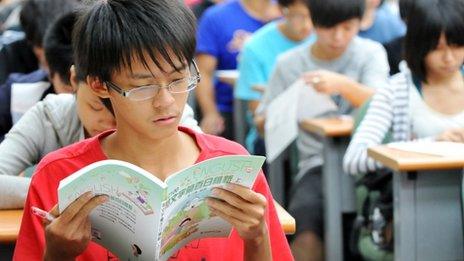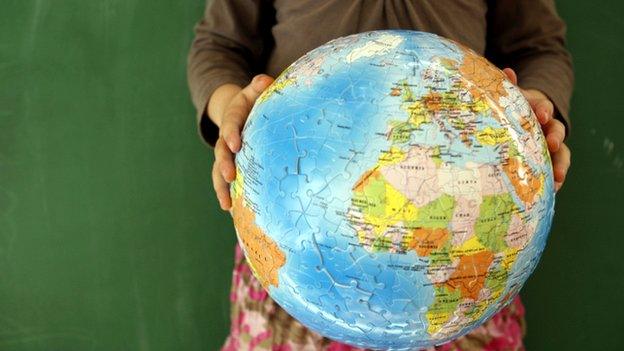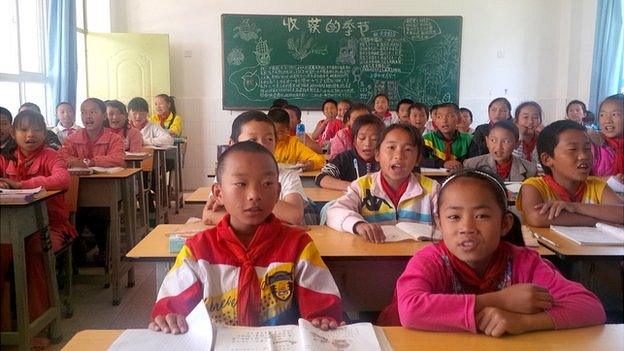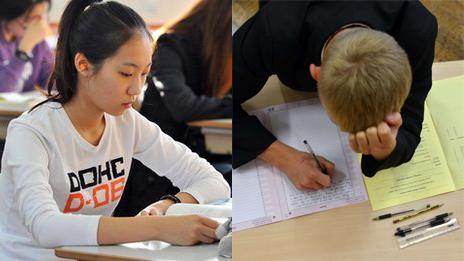Shanghai teachers flown in for maths
- Published
- comments

Asian countries were top performers at maths in Pisa tests
Up to 60 Shanghai maths teachers are to be brought to England to raise standards, in an exchange arranged by the Department for Education.
They will provide masterclasses in 30 "maths hubs", which are planned as a network of centres of excellence.
The Chinese city's maths pupils have the highest international test results.
The announcement comes as a campaign is launched to raise adult maths skills, with warnings that poor numeracy is costing the UK economy £20bn per year.
The National Numeracy Challenge aims to improve numeracy levels for a million people.
It is providing an online self-assessment test, external - with help for those lacking in confidence in maths.
Financial cost
Mike Ellicock, chief executive of National Numeracy, says 78% of working-age adults have maths skills below the equivalent of a GCSE grade C - and that half only have the maths skills of a child leaving primary school.
A survey of 2,300 adults for the numeracy campaign found that over a third thought their level of maths had held them back.
An accompanying economic analysis said that a lack of maths skills cost the UK the equivalent of 1.3% of GDP or £20bn per year.
Improving standards in maths was about hard work, rather than any aptitude or a "maths gene", said Mr Ellicock.
The proposals to bring 60 English-speaking maths teachers from Shanghai is an attempt to learn from a city that has been the top performer in the OECD's Pisa tests.
The OECD says that children of poor families in Shanghai are on average better at maths than middle class children in the UK.
The Shanghai teachers, expected to arrive from the autumn, will help share their teaching methods, support pupils who are struggling and help to train other teachers.
They will be based in "maths hubs" - and bidding to become such a specialist centre will open on Wednesday.
The maths hubs will be partnerships of schools, which will work with maths experts and share best practice with other schools in their area.
"We have some brilliant maths teachers in this country but what I saw in Shanghai - and other Chinese cities - has only strengthened my belief that we can learn from them," said education minister, Elizabeth Truss, who has recently visited Shanghai, accompanied by head teachers from England.
"They have a can-do attitude to maths - and I want us to match that, and their performance."
She emphasised the economic significance of raising maths standards, for individuals and the country.
Maths teacher James Dathan tells 5 live: "We have outstanding maths teachers in this country"
"As part of our long term economic plan, we are determined to drive up standards in our schools and give our young people the skills they need to succeed in the global race.
"Good maths qualifications have the greatest earnings potential and provide the strongest protection against unemployment," said the education minister.
Christine Blower, leader of the National Union of Teachers, warned that the results from Shanghai were not representative of the rest of China.
"The suggestion that all of China's students perform well in mathematics is a myth. The government's evidence for this comes from the Pisa findings of 2012 data which is based on the results of one particular province of China: Shanghai. This is home to the wealthiest and most highly educated Chinese citizens."
- Published14 October 2015

- Published12 February 2014

- Published3 December 2013
